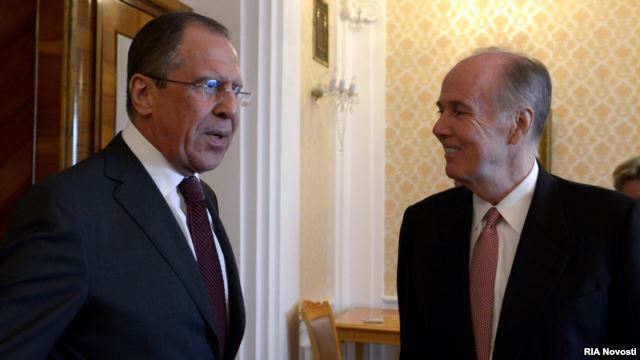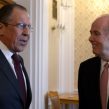
Moscow and Washington Exchange Blacklists of Undesirables
Publication: Eurasia Daily Monitor Volume: 10 Issue: 73
By:

Last week (April 12), the United States government published, in accordance with the US Magnitsky Act adopted last December, a list of 18 Russians accused of involvement in the death in custody of anti-corruption lawyer Sergei Magnitsky and other alleged rights abuses (https://www.treasury.gov/resource-center/sanctions/OFAC-Enforcement/Pages/20130412.aspx). The blacklisted Russians will be barred entry to the US and any assets they may have under US jurisdiction must be frozen. In a tit-for-tat move, the Russian authorities published a list of 18 undesirable Americans (https://english.ruvr.ru/2013_04_13/Russia-s-Guantanamo-List-officially-published/). The US Magnitsky list was relatively short and included only low- and middle-level officials, 16 of whom were directly involved in the prosecution of Magnitsky, plus two Chechens accused of murder. The Barack Obama administration clearly wanted to avoid a head-on clash with the Kremlin over the Magnitsky list, opting to make it as insignificant as possible and publishing it openly only because of a mandatory deadline included in the Magnitsky Act (Kommersant, RBK Daily, April 15).
The US has supplemented the Magnitsky list with a secret appendix of additional human rights abusers that is “two times shorter than the open 18-name list” and reportedly includes Chechen strongman and warlord Ramzan Kadyrov (Kommersant, April 15). Moscow in return did not show equal restraint: Sources in the Foreign Ministry told reporters “the Russian secret additional list contains more than 18 names of Americans, who will be banned entry” (Interfax, April 16). The Russian authorities not only exceeded their US counterparts in the tit-for-tat blacklisting, but also slammed the publication of the shortened version of the Magnitsky list as an unfriendly act. Kadyrov, in turn, mocked Washington, declaring: “My horse and I are gravely distressed, since we cannot visit America” (Kadyrov owns a stable of expensive racing horses in the United Arab Emirates, and the US State Department barred one of Kadyrov’s horses from participating in a US horserace in 2011). Kadyrov added: “I am glad to be on that list and as a Russian patriot will never visit the US, even if I am dropped from the list” (Interfax, April 15).
Obama’s White House seeks to befriend President Vladimir Putin’s regime at all costs, despite the latter’s aggressive anti-Americanism, Russian internal political repression and the bilateral tensions exacerbated by the Magnitsky Act. White House National Security Advisor Tom Donilon came to Moscow to meet with Russian officials and discuss improved relations this week just after the Magnitsky list’s publication. Donilon had a short informal meeting with Putin and handed over a personal letter from Obama, reportedly containing a road map of developing a joint partnership by concentrating on areas of mutual interest like nuclear arms control, non-proliferation, Syria, North Korea, Iran, stabilizing Afghanistan, as well as promoting trade and investment (27 points in all), while disregarding “temporary” obstacles like human rights violations. Putin promised to reply to Obama’s letter and a tentative agreement was reportedly reached to announce next September the resumption of regular, so-called “2+2 meetings” of US and Russian foreign and defense ministers (Kommersant, April 16). Putin’s foreign policy aide Yuri Ushakov expressed overall satisfaction with progress achieved during talks with Donilon: “The Obama administration wants to develop relations with us on different fronts, which is positive, but they do not want to restrict some American Russophobes [members of the US Senate and Congress], who hinder our relations” (Interfax, April 15).
The overall result of Obama’s attempt to play realpolitik by overlooking repression and human rights violations in Russia while concentrating on other important issues seems to be dismal. The Magnitsky list did not impress the Russian bureaucracy, while the possibility of any serious Kremlin concessions on Syria, Iran or anything else appears as remote as ever. This exercise in realpolitik is not only cynical, it is also extremely shortsighted. The Obama administration does not seem to understand either Putin or Russian society and its possible future development. It is a common feature of US foreign policy to actively befriend inherently unstable dictatorial regimes on the verge of their inevitable collapse—but the late shah of Iran or Egypt’s former President Hosni Mubarak were, despite everything, at least US allies. Whereas, Putin never was and never will be a close US ally. Present official anti-Americanism is the basis of Putin’s internal and external policy; it will not change an inch, no matter how many letters the White House writes, or how many top US officials come to Moscow to flatter the Russian president.
The Kremlin is using the narrative of an omnipotent US internal and external threat to smear the members of the pro-democracy movement inside Russia as “foreign agents.” The Magnitsky list is seen as an attempt by Washington to sideline Putin and win over the loyalty of the corrupt Russian officials by threatening their numerous foreign business interests, bank accounts and real estate (Novaya Gazeta, February 27). The briefness of the published Magnitsky list means nothing to Putin, however, when the loyalty of hundreds of thousands of officials is potentially in question.
Putin will give no ground on Syria, or Iran, or ballistic missile defense, or provide any real assistance in Afghanistan. On North Korea, Moscow does not and cannot act independently, but is following Beijing’s lead. Separately discussing North Korea with Moscow is not practical or particularly effective. The Kremlin’s overall understanding of compromise with Washington is to accept a public US capitulation on major issues to demonstrate Putin’s all-powerfulness, ensure internal loyalty and undermine the Russian opposition. The present debacle with the shortened Magnitsky list is, therefore, seen by many in the Russian pro-democracy opposition exactly for what it is—a realpolitik sellout (https://www.echo.msk.ru/blog/karamurza/1052306-echo/).
The prominent pro-democracy and anti-corruption activist Alexei Navalny is currently standing trial on trumped-up charges. In a recent interview, Navalny recognized that he will be tried in a kangaroo court, found guilty and most likely imprisoned, as will many other regime opponents: “Ether they will imprison us, or we will overthrow them. Or, most likely, they will first imprison us, and later we will overthrow them anyway. We will go into prison and then out. The system can hardly survive more than two years” (https://www.gazeta.ru/politics/2013/04/15_a_5256529.shtml). While Obama is trying without much success to placate Putin, a revolution in Russia—due to growing discontent, bureaucratic squabbles and economic stagnation—is increasingly becoming accepted as inevitable (https://borisakunin.livejournal.com/97577.html).




